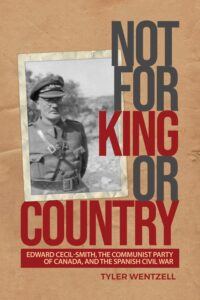Book Review: Edward Cecil-Smith, the Communist Party of Canada, and the Spanish Civil War
 Not for King or Country: Edward Cecil-Smith, the Communist Party of Canada, and the Spanish Civil War, by Tyler Wentzell. University of Toronto Press, 2020. 386 pp. $32.95.
Not for King or Country: Edward Cecil-Smith, the Communist Party of Canada, and the Spanish Civil War, by Tyler Wentzell. University of Toronto Press, 2020. 386 pp. $32.95.
Tyler Wentzell planned to launch Not for King or Country at the May 2020 ALBA Annual Celebration. His plan was an early victim of Covid-19, but Not for King or Country should not to be missed. It is a well-researched and informative biography of Mackenzie-Papineau (Mac-Pap) commander Edward Cecil-Smith, the longest serving battalion commander in the XVth International Brigade.
Wentzell set out to correct numerous historical inaccuracies while providing a well-researched account of Cecil-Smith’s life. Wentzell notes that he came to regard his subject as both “a man of his times and someone quite extraordinary” and walks the reader through Cecil-Smith’s life: from his formative years as the son of missionary parents in China; education at the Chefoo boarding school; first employment in Shanghai; and his move to Canada in his late teens. During the Great Depression, Cecil-Smith joined the Canadian communist party in 1931.
Cecil-Smith’s party standing combined with military experience in China and Canada made him a good choice to become an officer in Spain. By the age of twenty-five, Cecil-Smith attained the top non-commissioned rank in the Canadian non-active Militia Engineer Corps. Wentzell reinforces Sergeant Major Cecil-Smith’s credentials by citing his selection as the Sergeant Major for an Infantry training school, a billet that in most cases was filled by an active-duty non-commissioned officer. These credentials tapped him for Officer Training School shortly after arriving in Spain.
Cecil-Smith is remembered as a well-respected but little loved military leader. Wentzell explores Cecil-Smith’s path through Officer Training School, company command in the Washington Battalion, and his appointment as adjutant commander, and commander of the Mac-Paps. Wentzell’s description of the battles of Teruel, Seguro de los Baños and the first stage of the Retreats is among the best I have read. Especially noteworthy is Wentzell’s account of Cecil-Smith’s deployment of the Mac-Paps for the assault on the first hill at Seguro de los Baños.
Wentzell also discusses Cecil-Smith’s career post-Spain including his work as a journalist and his brief service with the Canadian Army during WWII. One area that Wentzell was unable to provide insight was Cecil-Smith’s decision to leave the Canadian Communist party. Wentzell notes that he was unable to find a clear reason for the break. Cecil-Smith appears to have simply “drifted away” from the party about twenty years prior to his death in 1963.
Not for King or Country also includes excellent maps for Teruel and the first stage of the Retreats. This book will sit well alongside the best of the growing collection of books on Canadian participation in the Spanish Civil War.
Chris Brooks is an ALBA Board member and manages the online volunteer database.












